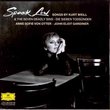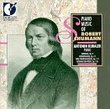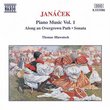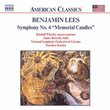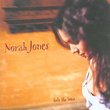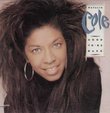| All Artists: Arthur Bliss, Edmund Rubbra, Malcolm Arnold, John [Composer/Conductor] Addison, Robert Whitney, Jorge Mester, Louisville Orchestra Title: British Modern Members Wishing: 0 Total Copies: 0 Label: First Edition Original Release Date: 1/1/2005 Re-Release Date: 10/18/2005 Genre: Classical Styles: Forms & Genres, Concertos, Historical Periods, Modern, 20th, & 21st Century, Symphonies Number of Discs: 1 SwapaCD Credits: 1 UPC: 809157190424 |
Search - Arthur Bliss, Edmund Rubbra, Malcolm Arnold :: British Modern
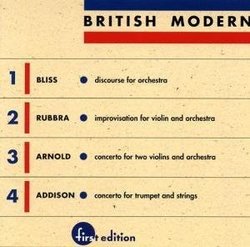 | Arthur Bliss, Edmund Rubbra, Malcolm Arnold British Modern Genre: Classical
|
Larger Image |
CD DetailsSimilarly Requested CDs
|
CD ReviewsRubbra's Improvisation the prize of this collection, Arnold' Discophage | France | 11/13/2007 (4 out of 5 stars) "As I wrote in my review of First Edition Music's collection of Louisville Orchestra-performed compositions by six Polish 20th Century composers(Polski Nowoczesny), there is (or was, as alas the company seems to have ceased its operations) a genuine, clever, sensible, cultured and musical mind at work behind these reissues. They represent a welcome break with the time-honored Louisville tradition, as they present highly coherent programs that fit snugly in one's music library. For all that the Louisville LP releases brought to the recorded legacy of 20th Century music of all schools and styles, one of their drawbacks was their motley programs and apparent haphazard bringing together on a single LP (or CD in the late 1980s and early 1990s) of composers with hardly any stylistic or personal ties. When First Edition acquired and started releasing the Louisville catalog in the early 2000s, they did so in the form of monographs, discs devoted to a single composer, collating Louisville recordings made at different times and thus usually offering fine overviews of the composer's development. In some of them, obviously for lack of material in the Louisville catalog, the total time was disappointingly short, anywhere between 40 and 50-minutes, but, at the cheap price demanded for them on the present site, that was a small downside in the face of the coherence and interest of the compilations.
But what to do when there wasn't enough music of a composer in the Louisville catalog to fill even that? Well, the mastermind in charge of artistic decisions at First Edition has cleverly and tastefully gathered four well-filled collections devoted respectively to Français Moderne (with compositions of Honegger and Ibert), Polski nowaczesny (see above), Magyar Modern (Kodaly, Antal Dorati as composer and Mathias Seiber) and this one, devoted to four British composers and totalling a commendable 67:30 minutes. All are stylistically conservative: the musical language doesn't go beyond Shostakovich and Prokofiev, which doesn't mean the compositions do not afford genuine musical pleasures. They are all premiere recordings by the way. As Malcom Arnold, John Addison was mainly active as a composer of film music, but unlike the former he didn't really establish a reputation in concert music. His Trumpet Concerto is an unsubstantial and light-hearted piece that could have been written by Poulenc at his lightest, although it becomes quite foot-lifting in its scurrying finale. Pleasant, but not memorable. Good stereo sound from 1969. Bliss' Discourse for orchestra, a Louisville commission premiered in October 1957 and recorded shortly after, is a sort of variation, or elaboration upon a rather dramatic motif based on simple intervals heard at the outset, subjected to a variety of moods and considerations corresponding to the composition's six movements and titled respectively "a preliminary view", "a more disturbing view", "a gayer one", "a contemplative one", "an emphatic statement of the subject", "A peroration followed by a quite close". Bliss withdrew the piece after its Louisville premiere and substantially reworked it (including a complete removal of the 2nd section), so this is the only recording of the first version. That said, the music is not as interesting as the piece's description. It is couched in the late-Romantic to timidly modern musical language so typical of British composer of that generation, and nowhere as personal as Vaughan Williams'. And maybe Bliss suppressed the 2nd section because it sounded so like Roussel's symphonies or ballets. The third sounds like Strauss. The fourth includes solo statements from the strings of heart-on-sleeve and somewhat sentimental lyricism, the fifth is agitated and dramatic but ultimately hollow, the finale goes for the grandiose and doesn't avoid the bombast. As mentioned, the sound is 1957 mono. Arnold's Concerto for Two Violins breaks no new ground but it is a pleasant work, rather dramatic in its dynamic outer movements (combined with an engrossing lyricism reminiscent of Prokofiev's Violin Concertos in the finale), and intensely lyrical in the 2nd - a worthy successor of the Vivaldi concertos written for the same combination of instruments. Peter McHugh and Paul Kling play with fine tone. Good stereo sound from 1973. To me the prize of this collection is Rubbra's 12+ minute improvisation (another Louisville commission). It has the brooding intensity of Shostakovich's Violin Concertos ; Bloch at his most serious, Bartok, even Britten's Violin Concerto also come fleetingly to mind, and Rubbra is not unworthy of all these imposing references. The recording was made in 1955 and sounds more distant than the stereo ones, but that doesn't impair enjoyment. The notes are those of the original LP editions, with a new general introduction to these four composers. " |

 Track Listings (13) - Disc #1
Track Listings (13) - Disc #1